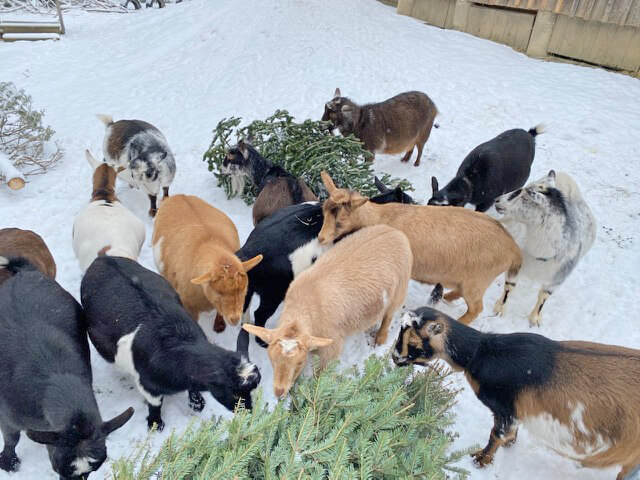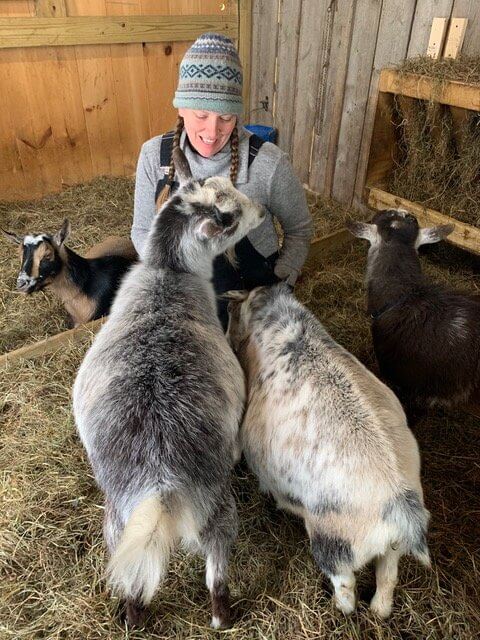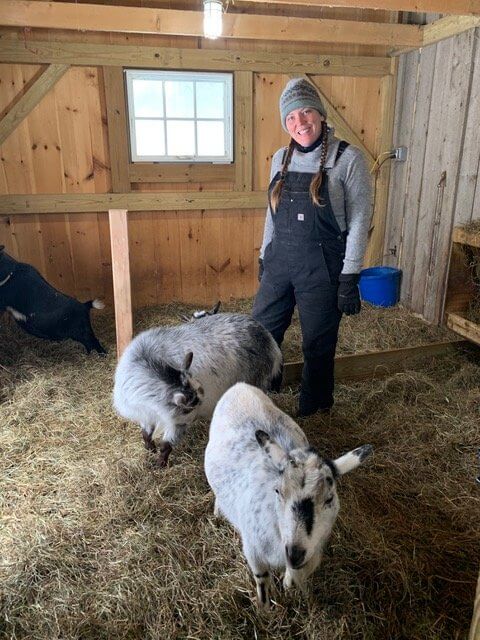Kidding around is serious business at Flower Gap Farm
Discarded Christmas trees are usually a sad punctuation mark to the holiday season.

Not, however, at Flower Gap Farm, a small artisanal operation that sells raw goat milk products on Mt. Philo Road. It welcomes donated trees as a source of nourishment and delight for owner Margaret Aiken’s 17 hungry Nigerian Dwarf goats. The gentle and friendly animals set upon them eagerly when Aiken, 43, drops them into their pens. The trees are rich in vitamin C, which is welcome in their winter diet, especially when the does are pregnant, as nine of them are this year.
Though it is the dead of winter, kidding season is not far off, judging from the visible side bulges on the does. It’s less than two months away, according to Aiken, who pegs Feb. 20 as the first due date in an intense, often sleepless period that will end by mid-March and add 20 to 30 new kids to the farm. After that, it won’t be long before Aiken resumes selling the butterfat-rich raw goat milk, yogurt and cheese that have earned her an enthusiastic following in the four years she’s been offering them on the small farm in Charlotte.

Aiken studied horticulture, not animal science, and worked at Virginia Tech researching herbaceous perennials before arriving in Vermont five years ago with her husband and five goats she had raised near Roanoke. When the couple divorced, she kept the goats and settled in Charlotte on the one-acre property she lives on today, working as a full-time caretaker for the family who owns it and expanding the herd a little at time. “They’re great for people wanting a small homestead-type situation, because they produce enough milk per family, but they don’t take a lot of space,” she explains of the Nigerian Dwarf breed. Some of Aiken’s farm income comes from selling kids to other small dairies and private families. “That’s why I started out with them. And then I realized how delicious the milk is. This breed in particular has the highest butterfat content, and so it tastes really rich and sweet.”
Unlike cow’s milk, consumption of goat milk is on the rise in America, according to the American Dairy Goat Association. It attributes this increase in part to the fact that goat milk is more easily digestible than cow’s milk and is slightly lower in lactose. “The fat globules are smaller than those found in cow milk and the curd is softer and smaller, making the digestion easier. Those who are allergic to cow milk may tolerate and thrive on goat milk,” the website claims.
The upward trend encouraged Aiken to begin selling her goats’ milk and try her hand at yogurt and cheese production, things she mostly taught herself and which she says are fairly simple because they don’t need pasteurization. Fortunately, Vermont is a good state to experiment in. According to the University of Vermont, it’s “one of 28 states that currently allow the sale of raw milk for human consumption. State laws require that the milk be sold directly from the farm.” Other farmers have also taken note: the Department of Agriculture listed 46 goat dairy farms in the state in 2021, up from 42 in 2019. Most of them are small farms like Aiken’s.

Aiken’s is a niche market for now, and she knows there will always be people who are opposed to raw milk for health and safety reasons. “It’s not without risk,” she acknowledges. “It’s unpasteurized milk…and it carries a risk. But I feel like I do all I can to mitigate that risk with my sanitation procedures and keeping really healthy goats.” She’s required to keep a log of all her customers, save samples of the milk batches and get the goats tested every year. To date, she’s never had an issue or a complaint. If anything, she can’t keep up with demand, and she’d eventually like to increase her production and expand her entire operation, including into a commercial kitchen. “I can see having a herd of 60 to 100 of these guys and having the volume to be able to stock store shelves,” she says.
Of the products that Aiken offers, “the yogurt is the biggest seller; that’s the thing that people go nuts for,” she says. It’s delectably thick and rich and comes in several flavors, including lemon curd, maple and plain, which she sells in refrigerated glass pint jars for 6 or 7 dollars. During peak production periods, Aiken uses 25 to 30 gallons of milk weekly. She isn’t using all that the goats produce, however, as she prefers dam-raised kids to bottle-fed ones. Other goat breeds produce more volume but can’t match the quality of the Nigerian Dwarfs, she contends, and so she intends to stick with them. “I really love this breed. I love their personalities and I love their milk.”
Standing in the small barn surrounded by her does (the two bucks are off in another pen), Aiken points them out by name, one by one, from oldest to youngest. Even without admitting that “it’s easy for me to just make the goats my life,” it’s obvious how much she loves and cares for her animals. The barn is immaculate, the kidding stalls that she built herself are ready for another season, and the cameras she installed to keep watch over her expectant mothers are already live-streaming video to her phone. This year, she even wants to add visits with the kids as one of her offerings.
To further expand her farming operation, Aiken would have to find a bigger piece of land—one that she could afford, which is notably difficult in Charlotte. Still, she would prefer to stay in the area. “I feel like I’ve really formed a community here, which is great. So, we’ll see what the future holds in terms of that, but goats will definitely be in it.”
Flower Gap Farm will likely begin selling raw goat milk and artisanal yogurt and cheese again in March. For more information, contact Margaret Aiken at 540-929-4785.

